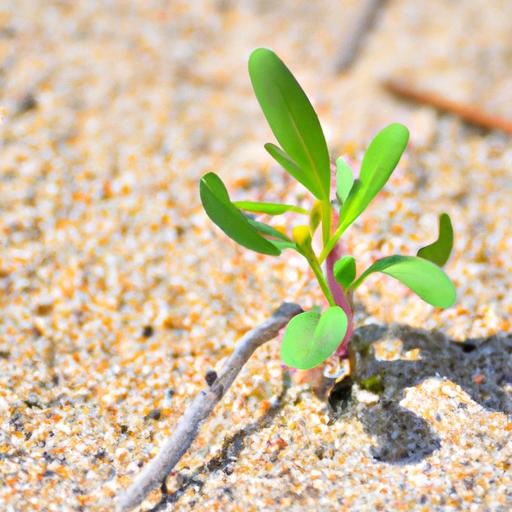Why Plants Are Important: The Vital Role They Play in Our Lives and the Environment

Plants are not merely green decorations that adorn our surroundings; they are the unsung heroes that sustain life on Earth. From the air we breathe to the food we eat, plants are at the core of our existence. In this article, we will delve into the myriad of reasons why plants are so crucial to our daily lives and the environment that surrounds us.
A. Importance of Plants in Our Daily Lives
Have you ever taken a moment to ponder the significance of plants in your day-to-day routine? Picture waking up in the morning, feeling the gentle warmth of sunlight streaming through your window. Did you know that plants are responsible for producing the oxygen you inhale and exhale with each breath? Through a miraculous process called photosynthesis, plants convert carbon dioxide into life-sustaining oxygen, ensuring our survival.
But their impact doesn’t stop there. Consider the vibrant hues of flowers that brighten up your surroundings or the soothing greenery that adorns your living spaces. Plants have an innate ability to uplift our spirits, enhancing our overall well-being. Research has shown that being around plants can reduce stress, boost productivity, and even speed up healing processes. Nature has a way of nurturing our souls, and plants are the embodiment of this natural therapy.
B. Overview of the Significance of Plants for the Environment
While plants undoubtedly play a vital role in our lives, their importance extends far beyond our immediate surroundings. Our planet’s delicate ecosystem depends on the intricate web of interactions between plants, animals, and the environment. Plants act as the foundation of this ecosystem, providing numerous benefits crucial for the well-being of our environment.
Firstly, plants serve as nature’s air purifiers. They absorb harmful pollutants from the air, making it cleaner and healthier for both humans and animals. Additionally, plants act as a natural carbon sink, absorbing carbon dioxide and mitigating the impact of climate change. Their role in preventing soil erosion is equally significant, as plant roots hold the soil together, preventing it from being washed away by rain or wind.
Moreover, the biodiversity that plants foster is unparalleled. They provide habitats, food, and shelter for countless organisms, contributing to the intricate balance of our ecosystems. From the smallest insects to majestic wildlife, plants are the lifeline that sustains the diversity of life on Earth.
In conclusion, plants are the unsung heroes that shape our world and our lives. From the air we breathe to the beauty that surrounds us, their importance cannot be overstated. In the upcoming sections, we will explore the environmental, health, agricultural, and aesthetic benefits of plants, shedding light on the profound impact they have on various aspects of our existence. So, let’s dive deeper into the world of plants and discover why they are truly indispensable.
Environmental Benefits of Plants
Plants play a crucial role in maintaining the delicate balance of our environment. From oxygen production to climate regulation and biodiversity preservation, their importance cannot be overstated.
A. Role of Plants in Oxygen Production
Did you know that plants are the primary source of the oxygen we breathe? Through the process of photosynthesis, plants use sunlight to convert carbon dioxide into oxygen, releasing it back into the atmosphere. This oxygen not only sustains our lives but also supports the respiration of countless other organisms. Without plants, the air we inhale would lack the essential oxygen needed for survival.
B. Carbon Dioxide Absorption and Climate Regulation by Plants
In addition to oxygen production, plants also act as nature’s carbon dioxide absorbers. As they photosynthesize, they absorb carbon dioxide from the atmosphere, reducing its concentration. This crucial process helps mitigate the greenhouse effect and combat climate change. By absorbing carbon dioxide, plants play a significant role in regulating global temperatures and maintaining a stable climate.
C. Importance of Plants in Preventing Soil Erosion
Plants play a vital role in preventing soil erosion, a process that can have disastrous consequences for our environment. The roots of plants help bind the soil together, reducing the risk of erosion caused by wind or water. Without plants, fertile topsoil could be easily washed away, leading to reduced agricultural productivity, increased flooding, and ecological imbalances. By anchoring the soil, plants provide stability and protect the land from erosion.
D. Enhancing Biodiversity and Providing Habitats for Various Species
The intricate web of life on Earth depends on the diversity of species and habitats. Plants are the cornerstone of biodiversity, providing food, shelter, and breeding grounds for countless organisms. From towering trees in lush rainforests to delicate flowers in meadows, plants create habitats that support a wide array of animals and insects. They foster biodiversity by providing food sources and acting as hosts for symbiotic relationships, ensuring the survival of numerous species.
In conclusion, the environmental benefits of plants are vast and indispensable. From producing oxygen and absorbing carbon dioxide to preventing soil erosion and fostering biodiversity, plants are the guardians of our delicate ecosystem. Their preservation and conservation are crucial for maintaining a sustainable and thriving planet. In the next sections, we will explore the health benefits of plants, their agricultural importance, and their aesthetic and recreational value. Let’s continue to uncover the wonders that plants offer and why they are an integral part of our lives.
Health Benefits of Plants
Plants not only enhance the aesthetics of our surroundings but also have a profound impact on our health and well-being. Let’s explore the various ways in which plants contribute to our overall health.
A. Air Purification and Improvement of Indoor Air Quality by Plants
Did you know that indoor air pollution can be up to five times worse than outdoor air pollution? Fortunately, plants can come to the rescue. Through a process known as phytoremediation, plants absorb and neutralize harmful pollutants present in the air, effectively purifying the indoor environment. They act as natural air filters, removing toxins such as formaldehyde, benzene, and trichloroethylene, which are commonly found in household items and cleaning products.
Not only do plants purify the air, but they also increase humidity levels, preventing dryness and reducing the risk of respiratory issues. By incorporating plants into our indoor spaces, we can create healthier environments for ourselves and our loved ones.
B. Stress Reduction and Mental Well-being through Plant Presence
Life can be hectic, and stress has become an all-too-common companion for many. However, nature has a remarkable ability to calm our minds and restore balance. The presence of plants in our surroundings has been shown to reduce stress levels and improve our mental well-being.
Imagine coming home after a long, tiring day, greeted by the sight of lush green foliage and vibrant blooms. The tranquility and beauty of plants can create a sense of calm and serenity, melting away the stress and anxieties of the day. Studies have even indicated that exposure to nature, including plants, can alleviate symptoms of depression and anxiety, promoting a healthier state of mind.
C. Contribution of Plants to Physical Health and Healing Processes
Plants offer more than just psychological benefits; they also contribute to our physical health and aid in the healing process. Research has demonstrated that the presence of plants in hospitals or healthcare settings can speed up recovery rates and reduce the need for pain medication. Patients with a view of nature or access to green spaces tend to experience less pain and exhibit improved overall well-being.
Furthermore, plants have the remarkable ability to improve our immune system. The essential oils released by certain plants possess antimicrobial properties, helping to combat airborne bacteria and viruses. Breathing in the aroma of these plants can strengthen our defenses against respiratory infections and boost our overall immunity.
In conclusion, plants are not only visually appealing but also offer a multitude of health benefits. From purifying the air we breathe to reducing stress and aiding in physical healing, their presence has a transformative effect on our well-being. So, let’s embrace nature’s gift and incorporate plants into our lives to enjoy the remarkable advantages they provide.
Agricultural Importance of Plants
Plants are not only essential for our daily sustenance but also play a crucial role in the agricultural sector, shaping global nutrition, economies, and food security. Let’s explore the various dimensions of their agricultural importance.
A. Plant-based Food Production and its Impact on Global Nutrition
Plants serve as the primary source of nourishment for humans and animals alike. They provide us with a vast array of fruits, vegetables, grains, and legumes that form the cornerstone of a healthy diet. The abundance and diversity of plant-based foods contribute to a well-balanced nutritional intake, supplying essential vitamins, minerals, and dietary fiber. Moreover, plants offer a sustainable solution to combat malnutrition and address food shortages, as they can be cultivated in diverse climates and adapted to local needs.
B. Economic Significance of Plants as a Source of Income for Farmers
Agriculture forms the backbone of many economies worldwide, and plants are the driving force behind this sector. Farmers cultivate crops on vast expanses of land, dedicating their efforts to grow an assortment of plants that meet the demands of both local and global markets. The economic significance of plants cannot be overstated, as they generate income for farmers, support rural livelihoods, and contribute to the overall economic development of countries. From small-scale family farms to large agricultural enterprises, plants are the lifeline that sustains agricultural economies.
C. Role of Plants in Sustainable Agriculture and Food Security
In a world grappling with environmental challenges and a growing population, sustainable agriculture and food security have become paramount. Plants play a pivotal role in achieving these goals. By adopting sustainable farming practices such as crop rotation, agroforestry, and organic farming, plants help preserve soil fertility, reduce reliance on synthetic fertilizers, and minimize the use of harmful pesticides. Additionally, diverse crop cultivation and the preservation of native plant species contribute to the resilience of agricultural systems, making them less susceptible to pests, diseases, and climate fluctuations. The cultivation of a wide variety of plants also ensures a diverse and nutritious food supply, enhancing food security for communities around the globe.
In conclusion, the agricultural importance of plants extends beyond their nutritional value. They are not only the source of our sustenance but also the driving force behind agricultural economies and sustainable farming practices. As we move forward, it is crucial to recognize and support the vital role that plants play in ensuring global nutrition, economic prosperity for farmers, and a secure food supply for generations to come.
Aesthetic and Recreational Value of Plants
Plants have an undeniable ability to enhance the aesthetic appeal of both indoor and outdoor spaces. Whether it’s a lush garden, a well-curated indoor jungle, or a single potted plant on a windowsill, plants have a transformative effect on our surroundings.
A. Beautification of Indoor and Outdoor Spaces through Plants
Indoor spaces come alive with the addition of plants. They infuse a touch of nature into our homes and workplaces, creating a refreshing and vibrant ambiance. The presence of plants not only adds splashes of color but also softens the harsh edges of architectural elements, making the environment more inviting and pleasant. From small succulents to towering palm trees, plants have the power to turn any space into an oasis of green.
Similarly, outdoor spaces are elevated by the presence of plants. Gardens, parks, and landscapes are transformed into havens of beauty and tranquility. From meticulously manicured flower beds to wild meadows teeming with life, the variety and diversity of plants bring forth a tapestry of colors and textures that captivate our senses. The sight of blooming flowers and the rustling of leaves in the breeze create a serene atmosphere that nourishes our souls.
B. Role of Plants in Creating a Calming and Serene Atmosphere
Have you ever found solace in a peaceful garden or felt a sense of tranquility while walking through a forest? Plants have a remarkable ability to create a calming and serene atmosphere. Spending time amidst nature, surrounded by plants, can alleviate stress, reduce anxiety, and improve our overall well-being.
The presence of plants has been shown to lower blood pressure, reduce heart rate, and promote relaxation. Their green foliage and gentle swaying movements have a soothing effect on our minds, transporting us to a state of tranquility. Whether it’s a small plant on your desk or a stroll through a botanical garden, being in the presence of plants offers respite from the chaos of daily life and allows us to reconnect with nature.
C. Recreational Activities and Hobbies Related to Plants
Plants not only provide aesthetic value but also offer a range of recreational activities and hobbies that enrich our lives. Gardening, in particular, is a popular pastime that allows individuals to nurture and cultivate their own green spaces. From tending to flowers and vegetables to creating intricate landscapes, gardening provides a sense of accomplishment and fulfillment. It allows us to witness the growth and transformation of plants, fostering a deeper appreciation for nature’s wonders.
Additionally, botanical gardens offer a delightful escape for plant enthusiasts and curious visitors alike. These meticulously curated spaces showcase a diverse array of plant species, allowing us to explore different ecosystems and learn about the wonders of the botanical world. The beauty and knowledge gained from visiting botanical gardens inspire and ignite a passion for plants.
In conclusion, the aesthetic and recreational value of plants cannot be underestimated. They have the power to beautify our surroundings, create a serene atmosphere, and provide us with recreational activities that foster a deep connection with nature. So, whether you’re tending to your own garden or exploring the enchanting world of botanical gardens, immerse yourself in the wonders of plants and let them enrich your life.
Conclusion
Plants are not just passive bystanders in our lives; they are the foundation of our existence. Throughout this article, we have explored the multifaceted importance of plants in our daily lives and the environment. From their role in producing the oxygen we breathe to their ability to purify the air and mitigate climate change, plants are essential for our survival and the well-being of our planet.
Beyond their environmental significance, plants have a profound impact on our health and well-being. They contribute to cleaner indoor air, reduce stress levels, and create a calming and rejuvenating atmosphere. Engaging with plants through gardening or visiting botanical gardens provides us with recreational activities that reconnect us with nature and offer a sense of tranquility.
In the realm of agriculture, plants hold immense value as the source of our food and the livelihood of farmers. They nourish us, contribute to global nutrition, and sustain economies, making agriculture and food security possible. The sustainable practices of cultivating plants ensure the long-term well-being of our communities and the planet.
Lastly, plants bring beauty and aesthetic value to our surroundings. They enhance the aesthetics of indoor and outdoor spaces, creating visually pleasing environments. Whether it’s the vibrant colors of blooming flowers or the lush greenery of a garden, plants have an innate ability to uplift our spirits and provide a sanctuary amidst the bustling world.
In conclusion, the importance of plants cannot be overstated. They are the primary source of life, the backbone of ecosystems, and an integral part of our daily lives. It is crucial that we recognize and appreciate their significance. Let us strive to conserve and protect plants, promoting a sustainable future where we can continue to reap the benefits they provide. So next time you encounter a plant, take a moment to marvel at its incredible contributions and be reminded of its irreplaceable presence in our world.
Conclusion: So above is the Why Plants Are Important: The Vital Role They Play in Our Lives and the Environment article. Hopefully with this article you can help you in life, always follow and read our good articles on the website: plants.123didulich.com




